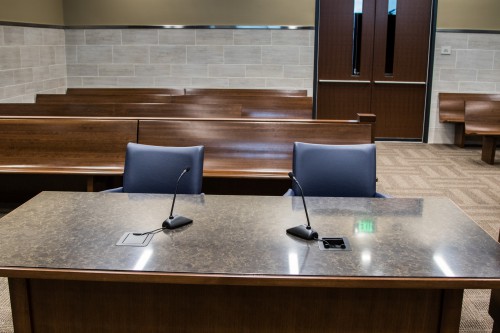
Update: the jury came back on Thursday and could not reach a verdict. Reportedly 10 jurors favored acquittal, while two held out for guilt. The prosecution quickly offered Nicholas Berends a misdemeanor plea agreement with two petty theft charges, which Mr. Berends accepted.
Original article:
By Kelsey Landon
Both the People and the defense rested Wednesday morning in the trial of Nicholas Brian Berends. Berends is facing charges of two counts of burglary in Department 14 of Yolo County Superior Court.
The jury would then hear both counsels’ closing arguments.
Judge David Rosenberg described to the jury what was necessary in order for Berend’s actions to be considered burglary: the defendant must have entered a room within a building with the intent to commit theft, and that building is not a commercial building.
Furthermore, there are two degrees of burglary, the first of which requires the defendant to enter an inhabited room or dwelling, even if the person is not in it. Berends is being charged with the first degree.
The judge went on to define larceny as the action of taking the property of someone else and intending to keep that property from the owner permanently.
Deputy DA Frits van der Hoek, representing the People, began his closing arguments by stating some the facts that were testified to in court—the defendant had entered a room within a building, 
PlayStations from within that room were missing, and Berends had admitted to taking and selling those PlayStations.
As far as intent goes, Mr. van der Hoek explained the fact that Berends used the money from the stolen PlayStations to buy a train ticket, to where he is originally from, proves his intent to steal.
Furthermore, the deputy DA claimed that because Berends stole from two different rooms further proves his intent.
Van der Hoek’s third point was that the home was not a commercial establishment, which is why this was a case of burglary and not of shoplifting.
Van der Hoek closed on the point that, because of these reasons, there was no reasonable doubt that Berends had committed burglary in the first degree.
It was then the defense counsel’s turn to make a closing argument, and Deputy Public Defender Martha Sequeira addressed the court.
Ms. Sequeira began by establishing that the facts were undeniable, Berends had committed some sort of theft, but because the prosecution chose to charge him with the felony burglary charge, instead of theft, they had a larger burden of proof.
The defense questioned whether or not it was possible for the occupant of a dwelling to burglarize that same dwelling.
Sequeira established that entering into different rooms of a burglarized house could not be considered more burglary unless those rooms are separate dwelling places.
Dwelling has no legal meaning, therefore its common definition is used—a house/apartment or separate place of residence.
Sequeira argued that, since there were no locks on the doors of the separate rooms, and that because Berends had access to belongings that were not his, the rooms were not separate dwellings and therefore this case could not be considered burglary.
The house in which Berends stole items was a single-family residence where Berends resided and in which he spent hours alone every day.
Sequeira went on to claim that there was no lease agreement which clarified boundaries within the house at the time the theft was committed, and that one of the witnesses only made one after the preliminary hearing in an attempt to produce evidence.
The defense closed their argument in stating that Berends was never told not to go into those separate rooms, and therefore charging him with burglary would not be applicable in what we commonly believe to be a single-family residence.
Van der Hoek in his rebuttal closing argument claimed the laws and facts were not on the defense’s side.
The deputy DA claimed that, even if those rooms were not separate dwellings, Berends still committed at least one count of burglary because he violated a room that was not his within a building.
The closing arguments ended and the jury then received its final instructions and was sent to deliberate.






Want to understand why Yolo County leads the state in per capita trials? this case is a clear example. DA stretches to get this to a felony, jury hangs but 10-2 for acquittal and then the DA settles the case for what they should have charged it in the first place. The problem is, they went to trial, wasted taxpayer money and the jurors time not to mention the defendant and victims time. And for what? To charge this as a felony?